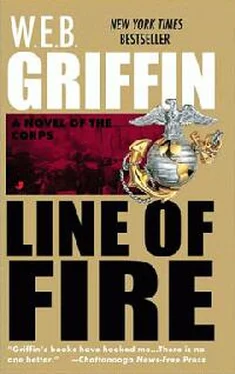W.E.B. Griffin - The Corps V - Line of Fire
Здесь есть возможность читать онлайн «W.E.B. Griffin - The Corps V - Line of Fire» весь текст электронной книги совершенно бесплатно (целиком полную версию без сокращений). В некоторых случаях можно слушать аудио, скачать через торрент в формате fb2 и присутствует краткое содержание. Жанр: prose_military, на английском языке. Описание произведения, (предисловие) а так же отзывы посетителей доступны на портале библиотеки ЛибКат.
- Название:The Corps V - Line of Fire
- Автор:
- Жанр:
- Год:неизвестен
- ISBN:нет данных
- Рейтинг книги:4 / 5. Голосов: 1
-
Избранное:Добавить в избранное
- Отзывы:
-
Ваша оценка:
- 80
- 1
- 2
- 3
- 4
- 5
The Corps V - Line of Fire: краткое содержание, описание и аннотация
Предлагаем к чтению аннотацию, описание, краткое содержание или предисловие (зависит от того, что написал сам автор книги «The Corps V - Line of Fire»). Если вы не нашли необходимую информацию о книге — напишите в комментариях, мы постараемся отыскать её.
The Corps V - Line of Fire — читать онлайн бесплатно полную книгу (весь текст) целиком
Ниже представлен текст книги, разбитый по страницам. Система сохранения места последней прочитанной страницы, позволяет с удобством читать онлайн бесплатно книгу «The Corps V - Line of Fire», без необходимости каждый раз заново искать на чём Вы остановились. Поставьте закладку, и сможете в любой момент перейти на страницу, на которой закончили чтение.
Интервал:
Закладка:
"That won't cut it," Stecker said. "Sorry."
"Excuse me, Sir," the corporal said politely, turned his back, and gestured with his thumb to the sergeant that the Second Lieutenant was posing a problem.
The sergeant walked to the counter.
"Can I help you, Lieutenant?"
"I'm on my way to the Grumman plant at Bethpage, L.I. I need transportation."
"Yes, Sir. The way you do that is catch the bus to Penn Station in New York City. And a train from there. You just missed the seventeen-hundred bus, and the next one is at nineteen-thirty."
"If I wait for the nineteen-thirty bus I won't get out there until midnight."
"Sir, you just missed the bus."
"We're scheduled for an oh-six-hundred takeoff, Sergeant. I am not about to get into an airplane and fly to Florida on five hours sleep. If you can't get us a ride, please get the officer of the day on the telephone," Stecker said.
The sergeant looked carefully at the Lieutenant's orders and then at the Lieutenant and decided that what he should do was arrange for a station wagon. This was not the kind of second lieutenant, in other words, who could be told to sit down and wait for the next bus.
"I'll call the motor pool, Sir. It'll take a couple of minutes."
"Thank you, Sergeant."
"Yes, Sir."
Dick Stecker was less awed with the sergeant-for that matter, with The Marine Corps-than most second lieutenants were. For one thing he was a regular; the service was his way of life, not an unwelcome interruption before he could get on with being a lawyer, a movie star, or a golf professional.
More important, he was a second-generation Marine. He had grown up on Marine installations around the country and in China. While he and Pick Pickering both believed that there were indeed three ways to do things-the right way, the wrong way, and The Marine Corps Way-Pickering viewed The Marine Corps Way as just one more fucking infringement on his personal liberty, and Dick Stecker regarded The Marine Corps Way as an opportunity.
Their current situation was a case in point. The Marine Corps seemed for the moment to have misplaced them-as opposed to having actually lost them. So far as they knew, immediately on certification as qualified in a particular aircraft, every other Marine Corps Second Lieutenant Naval Aviator had been transferred to an operational squadron for duty.
Most F4F Grumman Wildcat pilots were assigned to the Pacific, either to a specific squadron or to one of the Marine Air Groups. The Marine Corps had lost a lot of pilots in the battles of the Coral Sea and Midway and in connection with the invasion of Guadalcanal.
It followed that Lieutenants Stecker and Pickering, duly certified as qualified to fly Wildcats, should have been on their way to the Pacific some time ago. Or failing that, they should have been assigned to one of the fighter squadrons forming in the United States for later service in that theater.
But that hadn't happened. They were "temporarily" assigned to the Naval Air Station, Pensacola, Florida (where they'd learned how to fly less than a year before), picking up brand-new Wildcats at the Grumman factory and ferrying them all over the country.
This bothered "Pick" Pickering no end. He wanted to be where the fighting was, not cooling his ass in the United States.
He also wallowed in fear that they would be permanently assigned to Pensacola as instructor pilots, spending the war in the backseat of a Yellow Peril teaching people how to fly, while the rest of their peers were off covering themselves with glory in the Pacific.
Dick Stecker had a pretty good idea about why they were doing what they were doing. And while Pickering had listened politely to Stecker's explanation, he didn't accept a word of it. Possibly, in Stecker's view, because it was too simple:
Dick Stecker received his commission from the United States Military Academy at West Point. Since very few Marine officers took their commissions from the Army trade school, screwed up The Marine Corps' Pilot Procurement Program scheduling insofar as Lieutenant Stecker was concerned.
Pickering received his commission from the officer candidate school at Quantico. The idea of becoming a Marine Aviator never entered his mind until he was given a chance to volunteer for pilot training as an alternative to what The Corps had in mind for him: mess officer.
Before coming into The Corps, Pickering had worked in hotels; he knew how to run bars and kitchens. The Corps needed people with experience in those areas, and The Corps was notoriously nonsensitive to the career desires of newly commissioned second lieutenants, even those whose announced intention was to start fighting the Japs as soon as possible.
But Pickering had a friend in high places. Long before he himself had been commissioned and learned how to fly, Brigadier General D. G. McInerney had been a sergeant at Belleau Wood in 1917. One of his corporals then had been Pick Pickering's father, currently a reserve Navy officer on duty somewhere in the Pacific. The elder Pickering and McInerney had maintained their friendship over the years.
While acknowledging that The Corps did need mess officers, General McInerney decided it needed pilots more, and would just have to make a mess officer out of some other lieutenant who did not possess young Pickering's splendid physical attributes, high intelligence, and tested genetic heritage.
Lieutenants Stecker and Pickering both arrived at Pensacola for training at the same time. Lieutenant Stecker did not think this was pure coincidence. Dick Stecker's father, Jack (NMI) Stecker, now an officer with the First Marine Division on Guadalcanal, had also been at Belleau Wood with General McInerney.
After Pickering and Stecker arrived at Pensacola, their basic flight training was not conducted in accord with the rigidly structured and scheduled system that other young pilots were subjected to. For one thing they were not assigned to a large class. And while they completed the exact syllabus of training everyone else was given, they did not do it as part of any particular training squadron. They took some ground school courses with one training squadron, other ground school courses with other training squadrons. And when it came time' for them to actually climb into an airplane, their instructor pilots were not just instructor pilots but senior instructor pilots.
Even though the normal duties of senior instructor pilots were supervision of other instructor pilots and giving check rides, they could and did fit two orphans into their available time, for The Good of The Corps. It was a secret only to Lieutenants Stecker and Pickering that General McInerney inquired every week or so into their progress.
When they completed the course, they did not march in dress whites in a graduation parade to the stirring strains of "Anchors Aweigh" and the Marine Hymn played by a Navy band.
Their wings of gold were pinned on one Tuesday afternoon in the office of a Navy captain who seemed baffled by what was going on.
After that they were recommended for fighter training... probably, in Dick Stecker's judgment, because none of their IPs felt comfortable announcing that one of his students didn't have that extra something special required of fighter pilots especially with General McInerney in the audience.
And when they went down the Florida peninsula for Wildcat training, they again received the prescribed training, but they got it from pilots who were not only qualified IPs, but were also functioning in operational squadrons. So they were taught the way it really is, rather than the way the Navy brass thought it should be.
In fact, because of the quality of their instruction, they were just a shade better pilots than other young aviators of equivalent experience. Pickering considered that he was fully qualified to battle the Dirty Jap right now; Stecker was perfectly happy with the opportunity to get more hours in the Wildcat.
Читать дальшеИнтервал:
Закладка:
Похожие книги на «The Corps V - Line of Fire»
Представляем Вашему вниманию похожие книги на «The Corps V - Line of Fire» списком для выбора. Мы отобрали схожую по названию и смыслу литературу в надежде предоставить читателям больше вариантов отыскать новые, интересные, ещё непрочитанные произведения.
Обсуждение, отзывы о книге «The Corps V - Line of Fire» и просто собственные мнения читателей. Оставьте ваши комментарии, напишите, что Вы думаете о произведении, его смысле или главных героях. Укажите что конкретно понравилось, а что нет, и почему Вы так считаете.









